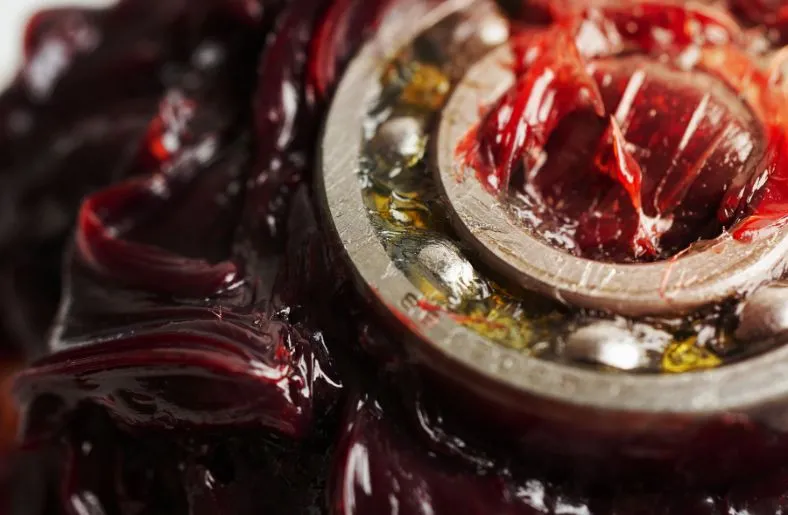Lubricants play a crucial role in ensuring the smooth and efficient operation of various machinery and equipment. They reduce friction and wear between moving parts, preventing damage and extending the lifespan of the components. Two popular types of lubricants that are widely used in various industries are moly grease and lithium grease.
In this article, we will delve into the characteristics, advantages, and disadvantages of both moly grease vs lithium grease to determine which lubricant reigns supreme.
Table of Contents
What is Moly Grease?
Moly grease, also known as molybdenum disulfide grease, is a type of lubricant that contains molybdenum disulfide particles. These particles act as solid lubricants, providing an extra layer of protection against wear and extreme pressure. Moly grease is commonly used in heavy-duty applications where high loads and temperatures are present, such as in automotive chassis, construction equipment, and industrial machinery.
One of the key advantages of moly grease is its excellent load-carrying capacity. The molybdenum disulfide particles create a protective film on the metal surfaces, reducing friction and preventing metal-to-metal contact. This makes moly grease ideal for applications with heavy loads and shock loads. Additionally, moly grease has high temperature resistance, making it suitable for use in high-temperature environments.
However, moly grease also has some disadvantages. It can be more expensive compared to other types of grease, and its solid particles can settle at the bottom of the container over time, requiring thorough mixing before use. Moreover, moly grease may not be suitable for applications where water or moisture is present, as it can wash away the solid lubricant particles.
What is Lithium Grease?
Lithium grease is a multi-purpose lubricant that is widely used in various industries. It is made by thickening mineral oil with lithium soap, which gives it its characteristic consistency. Lithium grease is versatile and can be used in a wide range of applications, from automotive and marine to industrial and household.
One of the main advantages of lithium grease is its excellent resistance to water and moisture. It forms a protective barrier on the metal surfaces, preventing corrosion and rust. Lithium grease also has good temperature stability, allowing it to perform effectively in both high and low temperature environments. Another advantage is its compatibility with a wide range of materials, including rubber and plastics.
However, lithium grease also has some disadvantages. It has lower load-carrying capacity compared to moly grease, making it less suitable for applications with heavy loads. Additionally, lithium grease may not perform well under extreme pressure conditions, as it tends to soften and lose its consistency. It may also degrade over time, requiring more frequent reapplication.
Moly Grease vs Lithium Grease: A Comparison
When comparing moly grease vs lithium grease, several factors need to be considered. The choice between the two depends on the specific application and the requirements of the equipment or machinery.
In terms of load-carrying capacity, moly grease outperforms lithium grease. Its solid lubricant particles provide an extra layer of protection, reducing friction and wear under heavy loads. Moly grease is also more suitable for applications with shock loads, as it can withstand sudden impacts without losing its lubricating properties.
On the other hand, lithium grease excels in its resistance to water and moisture. It forms a protective barrier, preventing corrosion and rust. Lithium grease is also more versatile, as it can be used in a wide range of applications. It is often the preferred choice for general-purpose lubrication where heavy loads or extreme pressure conditions are not a concern.
Applications and Uses of Moly Grease
Moly grease finds its applications in various industries. It is commonly used in automotive chassis, ball joints, and wheel bearings, where heavy loads and extreme pressure conditions are present. Moly grease is also used in construction equipment, such as cranes and bulldozers, as well as in industrial machinery, including mining equipment and manufacturing machinery.
Its high load-carrying capacity makes it suitable for applications where wear and tear are a concern.
Applications and Uses of Lithium Grease
Lithium grease is a versatile lubricant that finds its applications in numerous industries. It is widely used in automotive applications, such as wheel bearings, hinges, and suspension systems. Lithium grease is also used in marine equipment, including boat trailers and winches, as well as in household applications, such as garage door tracks and door hinges.
Its resistance to water and moisture makes it suitable for applications where exposure to these elements is common.
Factors to consider when choosing between Moly Grease vs Lithium Grease
When deciding between moly grease vs lithium grease, several factors need to be considered. First, the specific application and the operating conditions should be evaluated. If heavy loads and extreme pressure conditions are present, moly grease may be the preferred choice. If resistance to water and moisture is crucial, lithium grease should be considered.
Another factor to consider is the compatibility with materials and the equipment or machinery being lubricated. Some materials may not be compatible with certain types of grease, leading to degradation or poor performance. It is important to consult the equipment manufacturer’s recommendations or seek professional advice when choosing the appropriate lubricant.
Cost and availability are also important factors to consider. Moly grease is generally more expensive compared to lithium grease. However, the cost should be weighed against the performance and the requirements of the specific application.
Related Guide: Gear Oil for Chain Lube: Is It a Suitable Alternative (2023-2024)? Explained
FAQs
1. Is lithium and moly grease compatible?
While lithium grease and moly grease can work together, choosing a grease specifically formulated for your needs for high-performance applications is best. Bisley International offers a range of additives for lithium and moly greases for various uses, including lithium hydroxide, stearic acid and molybdenum disulfide.
2. When not to use lithium grease?
It’s not advisable to use them on plastic parts. As lithium is based on petroleum, it tends to speed up the decay of rubber and plastic components. Lithium-based grease can withstand high temperatures and are perfect for cars, heavy machinery, and guns.
3. What is the difference between lithium grease and grease?
The main difference that exists between standard lubricating grease and lithium grease is that standard grease is often used in industrial settings and lithium grease is primarily used in domestic settings.
Conclusion
Both moly grease vs lithium grease have their advantages and disadvantages. Moly grease excels in its load-carrying capacity and high temperature resistance, making it suitable for heavy-duty applications with extreme pressure conditions. Lithium grease, on the other hand, shines in its resistance to water and versatility, making it ideal for general-purpose lubrication.
The choice between moly grease vs lithium grease ultimately depends on the specific application and the requirements of the equipment or machinery. It is important to evaluate factors such as load-carrying capacity, resistance to water, temperature stability, and compatibility with materials. Consulting the equipment manufacturer’s recommendations or seeking professional advice can help in making an informed decision. So, which lubricant reigns supreme? The answer lies in the application and the specific needs of your machinery or equipment.

